Impact of Leadership & Management on Tesco's Operations
VerifiedAdded on 2023/06/18
|15
|4341
|74
Report
AI Summary
This report provides an analysis of leadership and management within Tesco's operations, focusing on the differences between the roles of leaders and the functions of managers. It examines these roles in various situational contexts, such as conflict management and employee resistance to change. The report also explores different leadership theories and models, including situational and systems leadership, and evaluates their impact on Tesco's operational management. Furthermore, it discusses key approaches to operations management and the role that leaders and managers play in achieving business objectives. Finally, the report evaluates the factors in the business environment that affect operational management within Tesco, providing a comprehensive overview of the subject.
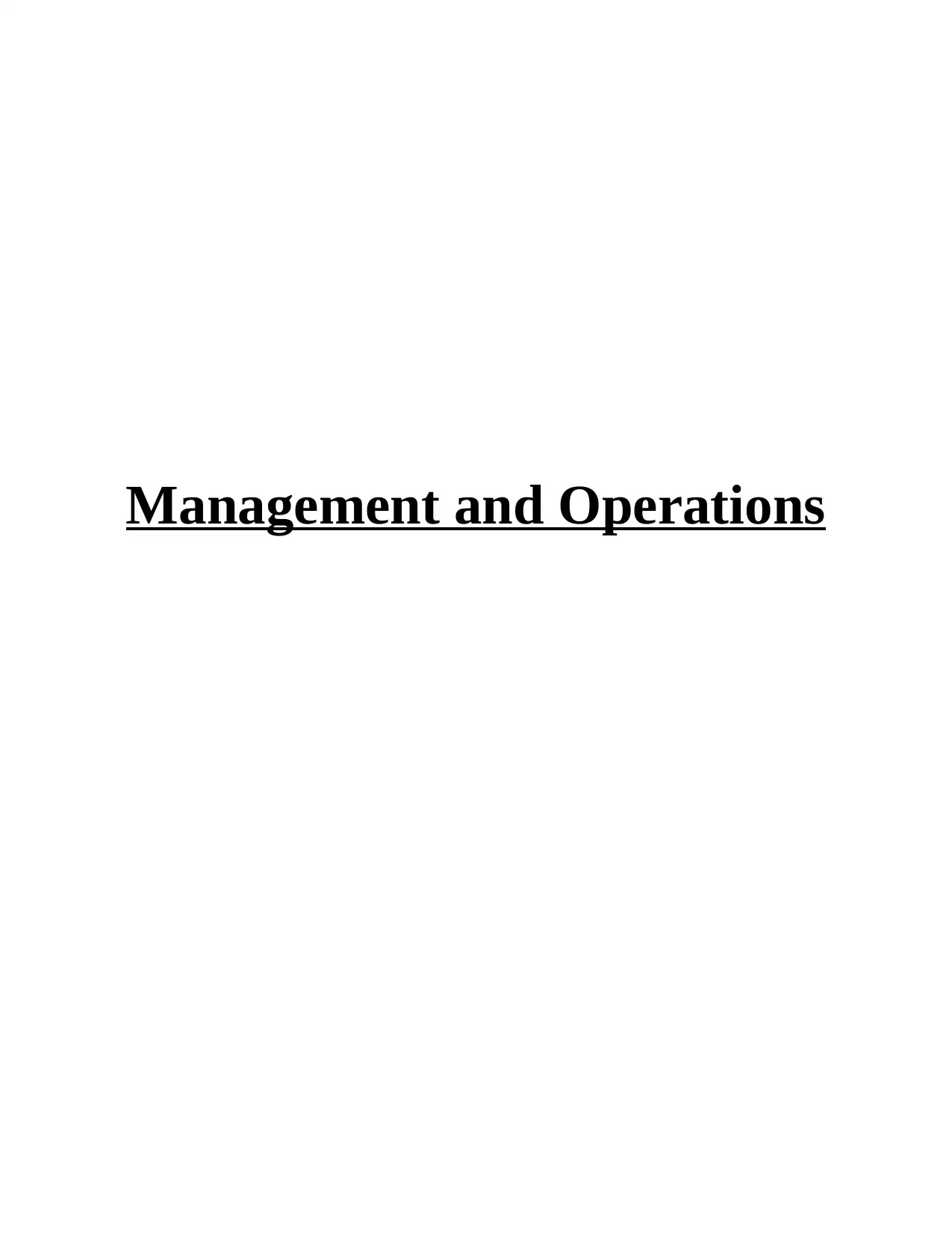
Management and Operations
Paraphrase This Document
Need a fresh take? Get an instant paraphrase of this document with our AI Paraphraser
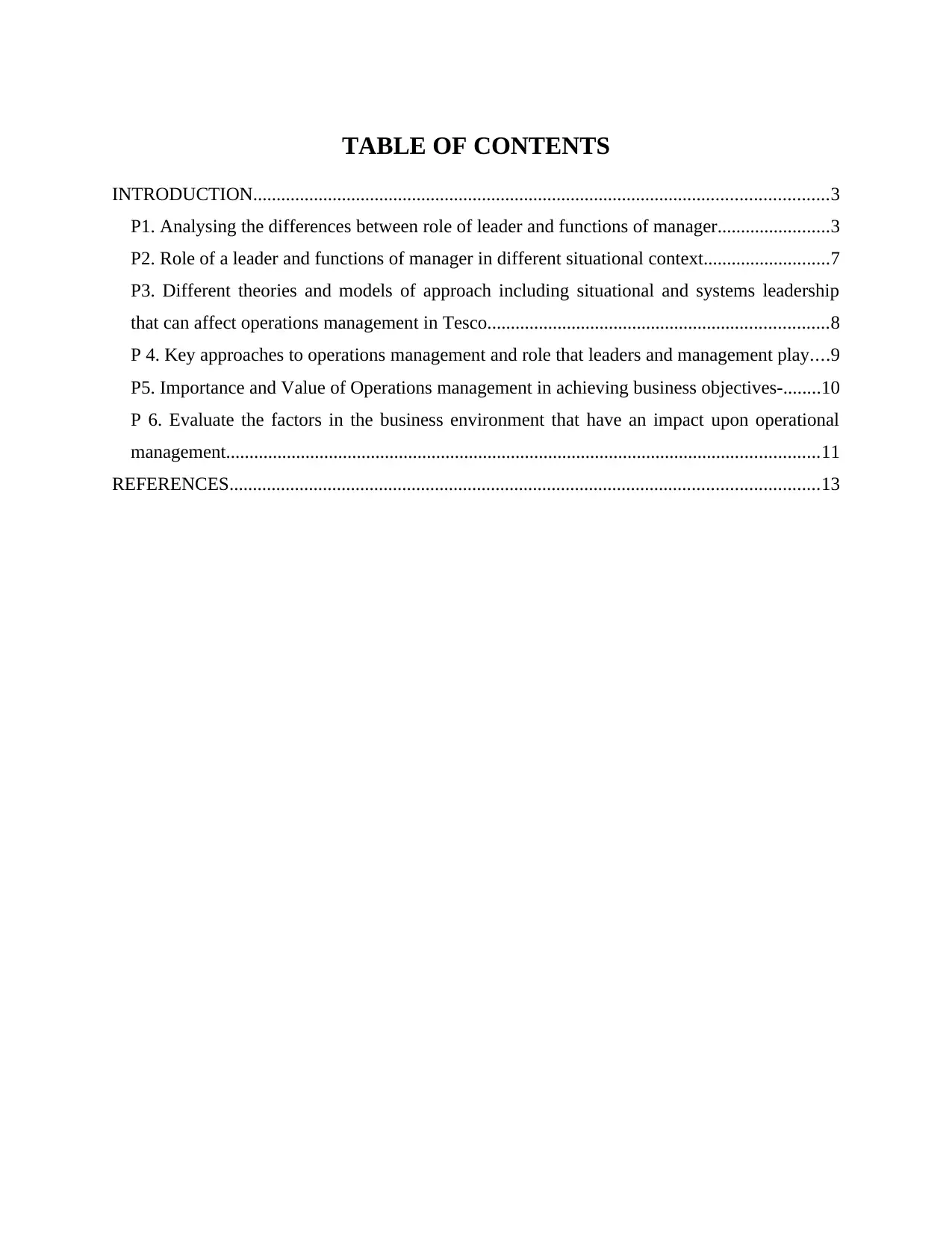
TABLE OF CONTENTS
INTRODUCTION...........................................................................................................................3
P1. Analysing the differences between role of leader and functions of manager........................3
P2. Role of a leader and functions of manager in different situational context...........................7
P3. Different theories and models of approach including situational and systems leadership
that can affect operations management in Tesco.........................................................................8
P 4. Key approaches to operations management and role that leaders and management play....9
P5. Importance and Value of Operations management in achieving business objectives-........10
P 6. Evaluate the factors in the business environment that have an impact upon operational
management...............................................................................................................................11
REFERENCES..............................................................................................................................13
INTRODUCTION...........................................................................................................................3
P1. Analysing the differences between role of leader and functions of manager........................3
P2. Role of a leader and functions of manager in different situational context...........................7
P3. Different theories and models of approach including situational and systems leadership
that can affect operations management in Tesco.........................................................................8
P 4. Key approaches to operations management and role that leaders and management play....9
P5. Importance and Value of Operations management in achieving business objectives-........10
P 6. Evaluate the factors in the business environment that have an impact upon operational
management...............................................................................................................................11
REFERENCES..............................................................................................................................13
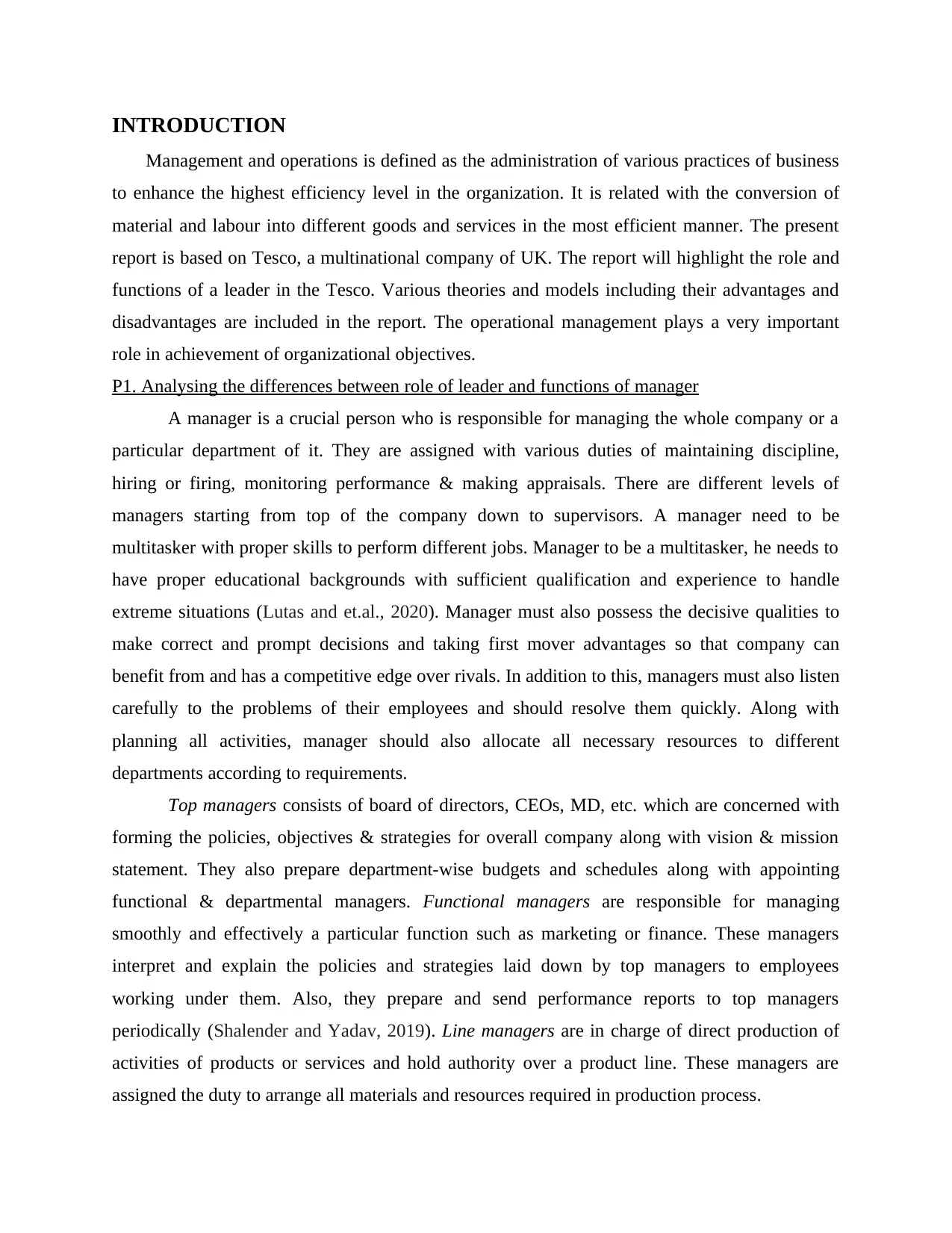
INTRODUCTION
Management and operations is defined as the administration of various practices of business
to enhance the highest efficiency level in the organization. It is related with the conversion of
material and labour into different goods and services in the most efficient manner. The present
report is based on Tesco, a multinational company of UK. The report will highlight the role and
functions of a leader in the Tesco. Various theories and models including their advantages and
disadvantages are included in the report. The operational management plays a very important
role in achievement of organizational objectives.
P1. Analysing the differences between role of leader and functions of manager
A manager is a crucial person who is responsible for managing the whole company or a
particular department of it. They are assigned with various duties of maintaining discipline,
hiring or firing, monitoring performance & making appraisals. There are different levels of
managers starting from top of the company down to supervisors. A manager need to be
multitasker with proper skills to perform different jobs. Manager to be a multitasker, he needs to
have proper educational backgrounds with sufficient qualification and experience to handle
extreme situations (Lutas and et.al., 2020). Manager must also possess the decisive qualities to
make correct and prompt decisions and taking first mover advantages so that company can
benefit from and has a competitive edge over rivals. In addition to this, managers must also listen
carefully to the problems of their employees and should resolve them quickly. Along with
planning all activities, manager should also allocate all necessary resources to different
departments according to requirements.
Top managers consists of board of directors, CEOs, MD, etc. which are concerned with
forming the policies, objectives & strategies for overall company along with vision & mission
statement. They also prepare department-wise budgets and schedules along with appointing
functional & departmental managers. Functional managers are responsible for managing
smoothly and effectively a particular function such as marketing or finance. These managers
interpret and explain the policies and strategies laid down by top managers to employees
working under them. Also, they prepare and send performance reports to top managers
periodically (Shalender and Yadav, 2019). Line managers are in charge of direct production of
activities of products or services and hold authority over a product line. These managers are
assigned the duty to arrange all materials and resources required in production process.
Management and operations is defined as the administration of various practices of business
to enhance the highest efficiency level in the organization. It is related with the conversion of
material and labour into different goods and services in the most efficient manner. The present
report is based on Tesco, a multinational company of UK. The report will highlight the role and
functions of a leader in the Tesco. Various theories and models including their advantages and
disadvantages are included in the report. The operational management plays a very important
role in achievement of organizational objectives.
P1. Analysing the differences between role of leader and functions of manager
A manager is a crucial person who is responsible for managing the whole company or a
particular department of it. They are assigned with various duties of maintaining discipline,
hiring or firing, monitoring performance & making appraisals. There are different levels of
managers starting from top of the company down to supervisors. A manager need to be
multitasker with proper skills to perform different jobs. Manager to be a multitasker, he needs to
have proper educational backgrounds with sufficient qualification and experience to handle
extreme situations (Lutas and et.al., 2020). Manager must also possess the decisive qualities to
make correct and prompt decisions and taking first mover advantages so that company can
benefit from and has a competitive edge over rivals. In addition to this, managers must also listen
carefully to the problems of their employees and should resolve them quickly. Along with
planning all activities, manager should also allocate all necessary resources to different
departments according to requirements.
Top managers consists of board of directors, CEOs, MD, etc. which are concerned with
forming the policies, objectives & strategies for overall company along with vision & mission
statement. They also prepare department-wise budgets and schedules along with appointing
functional & departmental managers. Functional managers are responsible for managing
smoothly and effectively a particular function such as marketing or finance. These managers
interpret and explain the policies and strategies laid down by top managers to employees
working under them. Also, they prepare and send performance reports to top managers
periodically (Shalender and Yadav, 2019). Line managers are in charge of direct production of
activities of products or services and hold authority over a product line. These managers are
assigned the duty to arrange all materials and resources required in production process.
⊘ This is a preview!⊘
Do you want full access?
Subscribe today to unlock all pages.

Trusted by 1+ million students worldwide
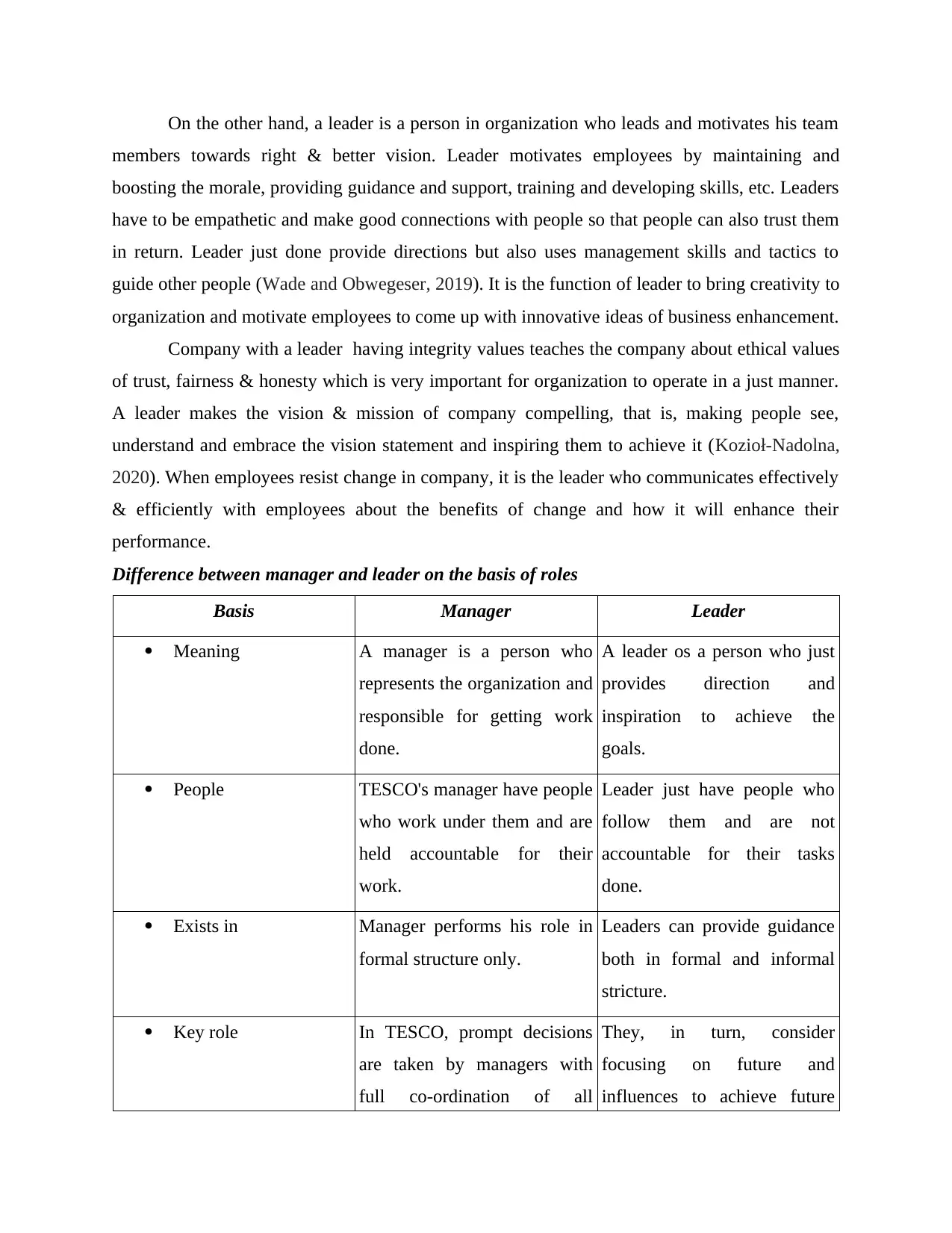
On the other hand, a leader is a person in organization who leads and motivates his team
members towards right & better vision. Leader motivates employees by maintaining and
boosting the morale, providing guidance and support, training and developing skills, etc. Leaders
have to be empathetic and make good connections with people so that people can also trust them
in return. Leader just done provide directions but also uses management skills and tactics to
guide other people (Wade and Obwegeser, 2019). It is the function of leader to bring creativity to
organization and motivate employees to come up with innovative ideas of business enhancement.
Company with a leader having integrity values teaches the company about ethical values
of trust, fairness & honesty which is very important for organization to operate in a just manner.
A leader makes the vision & mission of company compelling, that is, making people see,
understand and embrace the vision statement and inspiring them to achieve it (Kozioł-Nadolna,
2020). When employees resist change in company, it is the leader who communicates effectively
& efficiently with employees about the benefits of change and how it will enhance their
performance.
Difference between manager and leader on the basis of roles
Basis Manager Leader
Meaning A manager is a person who
represents the organization and
responsible for getting work
done.
A leader os a person who just
provides direction and
inspiration to achieve the
goals.
People TESCO's manager have people
who work under them and are
held accountable for their
work.
Leader just have people who
follow them and are not
accountable for their tasks
done.
Exists in Manager performs his role in
formal structure only.
Leaders can provide guidance
both in formal and informal
stricture.
Key role In TESCO, prompt decisions
are taken by managers with
full co-ordination of all
They, in turn, consider
focusing on future and
influences to achieve future
members towards right & better vision. Leader motivates employees by maintaining and
boosting the morale, providing guidance and support, training and developing skills, etc. Leaders
have to be empathetic and make good connections with people so that people can also trust them
in return. Leader just done provide directions but also uses management skills and tactics to
guide other people (Wade and Obwegeser, 2019). It is the function of leader to bring creativity to
organization and motivate employees to come up with innovative ideas of business enhancement.
Company with a leader having integrity values teaches the company about ethical values
of trust, fairness & honesty which is very important for organization to operate in a just manner.
A leader makes the vision & mission of company compelling, that is, making people see,
understand and embrace the vision statement and inspiring them to achieve it (Kozioł-Nadolna,
2020). When employees resist change in company, it is the leader who communicates effectively
& efficiently with employees about the benefits of change and how it will enhance their
performance.
Difference between manager and leader on the basis of roles
Basis Manager Leader
Meaning A manager is a person who
represents the organization and
responsible for getting work
done.
A leader os a person who just
provides direction and
inspiration to achieve the
goals.
People TESCO's manager have people
who work under them and are
held accountable for their
work.
Leader just have people who
follow them and are not
accountable for their tasks
done.
Exists in Manager performs his role in
formal structure only.
Leaders can provide guidance
both in formal and informal
stricture.
Key role In TESCO, prompt decisions
are taken by managers with
full co-ordination of all
They, in turn, consider
focusing on future and
influences to achieve future
Paraphrase This Document
Need a fresh take? Get an instant paraphrase of this document with our AI Paraphraser
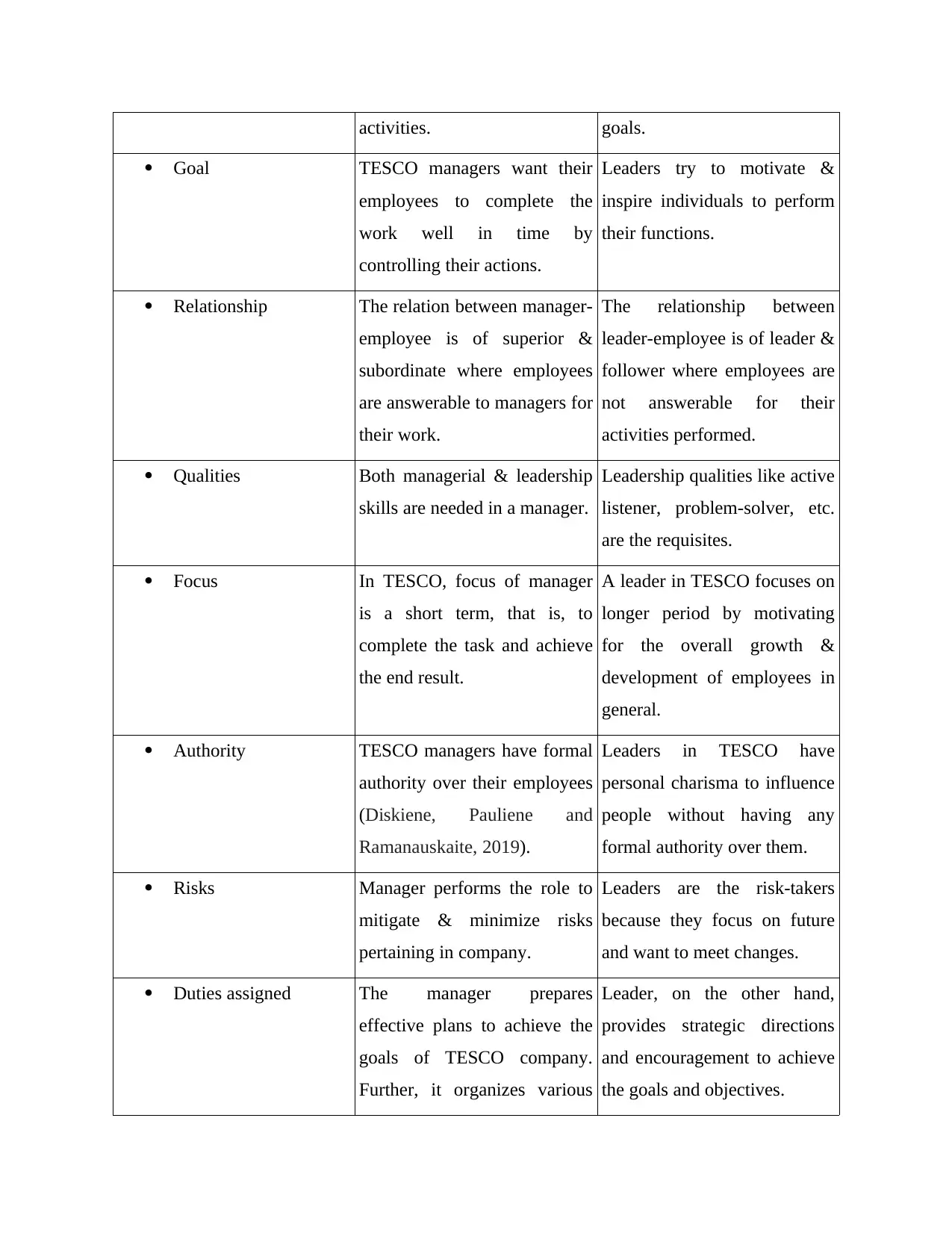
activities. goals.
Goal TESCO managers want their
employees to complete the
work well in time by
controlling their actions.
Leaders try to motivate &
inspire individuals to perform
their functions.
Relationship The relation between manager-
employee is of superior &
subordinate where employees
are answerable to managers for
their work.
The relationship between
leader-employee is of leader &
follower where employees are
not answerable for their
activities performed.
Qualities Both managerial & leadership
skills are needed in a manager.
Leadership qualities like active
listener, problem-solver, etc.
are the requisites.
Focus In TESCO, focus of manager
is a short term, that is, to
complete the task and achieve
the end result.
A leader in TESCO focuses on
longer period by motivating
for the overall growth &
development of employees in
general.
Authority TESCO managers have formal
authority over their employees
(Diskiene, Pauliene and
Ramanauskaite, 2019).
Leaders in TESCO have
personal charisma to influence
people without having any
formal authority over them.
Risks Manager performs the role to
mitigate & minimize risks
pertaining in company.
Leaders are the risk-takers
because they focus on future
and want to meet changes.
Duties assigned The manager prepares
effective plans to achieve the
goals of TESCO company.
Further, it organizes various
Leader, on the other hand,
provides strategic directions
and encouragement to achieve
the goals and objectives.
Goal TESCO managers want their
employees to complete the
work well in time by
controlling their actions.
Leaders try to motivate &
inspire individuals to perform
their functions.
Relationship The relation between manager-
employee is of superior &
subordinate where employees
are answerable to managers for
their work.
The relationship between
leader-employee is of leader &
follower where employees are
not answerable for their
activities performed.
Qualities Both managerial & leadership
skills are needed in a manager.
Leadership qualities like active
listener, problem-solver, etc.
are the requisites.
Focus In TESCO, focus of manager
is a short term, that is, to
complete the task and achieve
the end result.
A leader in TESCO focuses on
longer period by motivating
for the overall growth &
development of employees in
general.
Authority TESCO managers have formal
authority over their employees
(Diskiene, Pauliene and
Ramanauskaite, 2019).
Leaders in TESCO have
personal charisma to influence
people without having any
formal authority over them.
Risks Manager performs the role to
mitigate & minimize risks
pertaining in company.
Leaders are the risk-takers
because they focus on future
and want to meet changes.
Duties assigned The manager prepares
effective plans to achieve the
goals of TESCO company.
Further, it organizes various
Leader, on the other hand,
provides strategic directions
and encouragement to achieve
the goals and objectives.
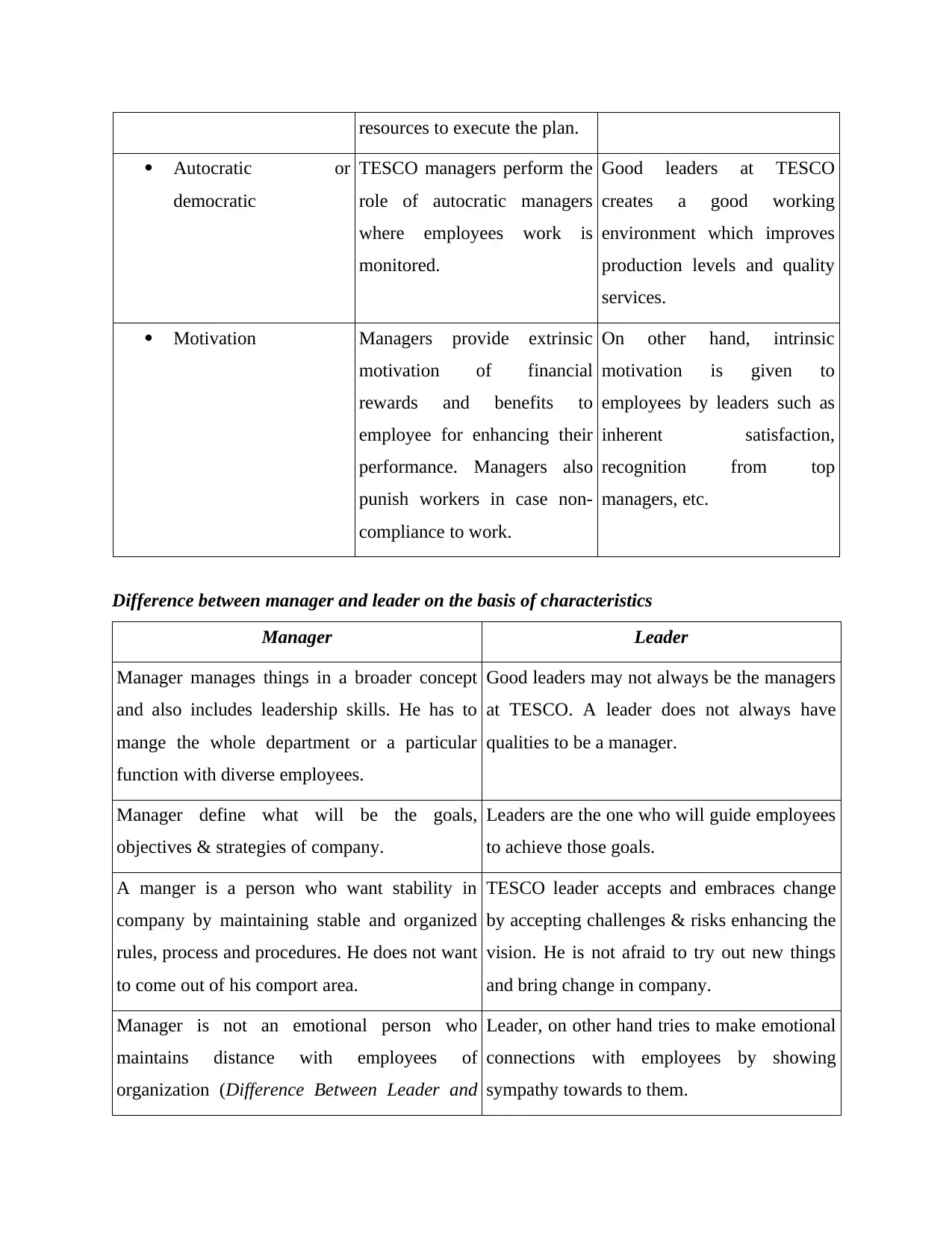
resources to execute the plan.
Autocratic or
democratic
TESCO managers perform the
role of autocratic managers
where employees work is
monitored.
Good leaders at TESCO
creates a good working
environment which improves
production levels and quality
services.
Motivation Managers provide extrinsic
motivation of financial
rewards and benefits to
employee for enhancing their
performance. Managers also
punish workers in case non-
compliance to work.
On other hand, intrinsic
motivation is given to
employees by leaders such as
inherent satisfaction,
recognition from top
managers, etc.
Difference between manager and leader on the basis of characteristics
Manager Leader
Manager manages things in a broader concept
and also includes leadership skills. He has to
mange the whole department or a particular
function with diverse employees.
Good leaders may not always be the managers
at TESCO. A leader does not always have
qualities to be a manager.
Manager define what will be the goals,
objectives & strategies of company.
Leaders are the one who will guide employees
to achieve those goals.
A manger is a person who want stability in
company by maintaining stable and organized
rules, process and procedures. He does not want
to come out of his comport area.
TESCO leader accepts and embraces change
by accepting challenges & risks enhancing the
vision. He is not afraid to try out new things
and bring change in company.
Manager is not an emotional person who
maintains distance with employees of
organization (Difference Between Leader and
Leader, on other hand tries to make emotional
connections with employees by showing
sympathy towards to them.
Autocratic or
democratic
TESCO managers perform the
role of autocratic managers
where employees work is
monitored.
Good leaders at TESCO
creates a good working
environment which improves
production levels and quality
services.
Motivation Managers provide extrinsic
motivation of financial
rewards and benefits to
employee for enhancing their
performance. Managers also
punish workers in case non-
compliance to work.
On other hand, intrinsic
motivation is given to
employees by leaders such as
inherent satisfaction,
recognition from top
managers, etc.
Difference between manager and leader on the basis of characteristics
Manager Leader
Manager manages things in a broader concept
and also includes leadership skills. He has to
mange the whole department or a particular
function with diverse employees.
Good leaders may not always be the managers
at TESCO. A leader does not always have
qualities to be a manager.
Manager define what will be the goals,
objectives & strategies of company.
Leaders are the one who will guide employees
to achieve those goals.
A manger is a person who want stability in
company by maintaining stable and organized
rules, process and procedures. He does not want
to come out of his comport area.
TESCO leader accepts and embraces change
by accepting challenges & risks enhancing the
vision. He is not afraid to try out new things
and bring change in company.
Manager is not an emotional person who
maintains distance with employees of
organization (Difference Between Leader and
Leader, on other hand tries to make emotional
connections with employees by showing
sympathy towards to them.
⊘ This is a preview!⊘
Do you want full access?
Subscribe today to unlock all pages.

Trusted by 1+ million students worldwide
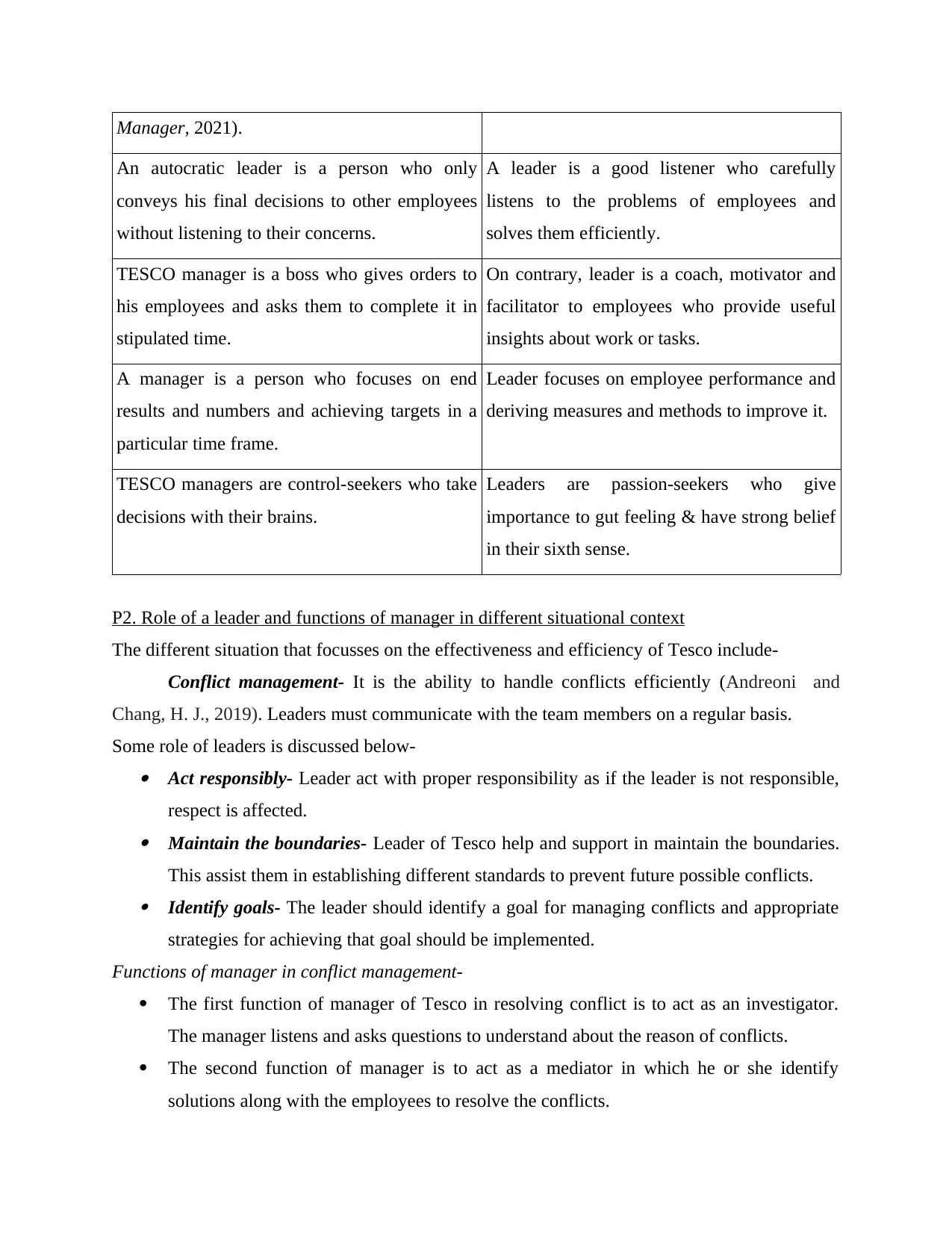
Manager, 2021).
An autocratic leader is a person who only
conveys his final decisions to other employees
without listening to their concerns.
A leader is a good listener who carefully
listens to the problems of employees and
solves them efficiently.
TESCO manager is a boss who gives orders to
his employees and asks them to complete it in
stipulated time.
On contrary, leader is a coach, motivator and
facilitator to employees who provide useful
insights about work or tasks.
A manager is a person who focuses on end
results and numbers and achieving targets in a
particular time frame.
Leader focuses on employee performance and
deriving measures and methods to improve it.
TESCO managers are control-seekers who take
decisions with their brains.
Leaders are passion-seekers who give
importance to gut feeling & have strong belief
in their sixth sense.
P2. Role of a leader and functions of manager in different situational context
The different situation that focusses on the effectiveness and efficiency of Tesco include-
Conflict management- It is the ability to handle conflicts efficiently (Andreoni and
Chang, H. J., 2019). Leaders must communicate with the team members on a regular basis.
Some role of leaders is discussed below- Act responsibly- Leader act with proper responsibility as if the leader is not responsible,
respect is affected. Maintain the boundaries- Leader of Tesco help and support in maintain the boundaries.
This assist them in establishing different standards to prevent future possible conflicts. Identify goals- The leader should identify a goal for managing conflicts and appropriate
strategies for achieving that goal should be implemented.
Functions of manager in conflict management-
The first function of manager of Tesco in resolving conflict is to act as an investigator.
The manager listens and asks questions to understand about the reason of conflicts.
The second function of manager is to act as a mediator in which he or she identify
solutions along with the employees to resolve the conflicts.
An autocratic leader is a person who only
conveys his final decisions to other employees
without listening to their concerns.
A leader is a good listener who carefully
listens to the problems of employees and
solves them efficiently.
TESCO manager is a boss who gives orders to
his employees and asks them to complete it in
stipulated time.
On contrary, leader is a coach, motivator and
facilitator to employees who provide useful
insights about work or tasks.
A manager is a person who focuses on end
results and numbers and achieving targets in a
particular time frame.
Leader focuses on employee performance and
deriving measures and methods to improve it.
TESCO managers are control-seekers who take
decisions with their brains.
Leaders are passion-seekers who give
importance to gut feeling & have strong belief
in their sixth sense.
P2. Role of a leader and functions of manager in different situational context
The different situation that focusses on the effectiveness and efficiency of Tesco include-
Conflict management- It is the ability to handle conflicts efficiently (Andreoni and
Chang, H. J., 2019). Leaders must communicate with the team members on a regular basis.
Some role of leaders is discussed below- Act responsibly- Leader act with proper responsibility as if the leader is not responsible,
respect is affected. Maintain the boundaries- Leader of Tesco help and support in maintain the boundaries.
This assist them in establishing different standards to prevent future possible conflicts. Identify goals- The leader should identify a goal for managing conflicts and appropriate
strategies for achieving that goal should be implemented.
Functions of manager in conflict management-
The first function of manager of Tesco in resolving conflict is to act as an investigator.
The manager listens and asks questions to understand about the reason of conflicts.
The second function of manager is to act as a mediator in which he or she identify
solutions along with the employees to resolve the conflicts.
Paraphrase This Document
Need a fresh take? Get an instant paraphrase of this document with our AI Paraphraser
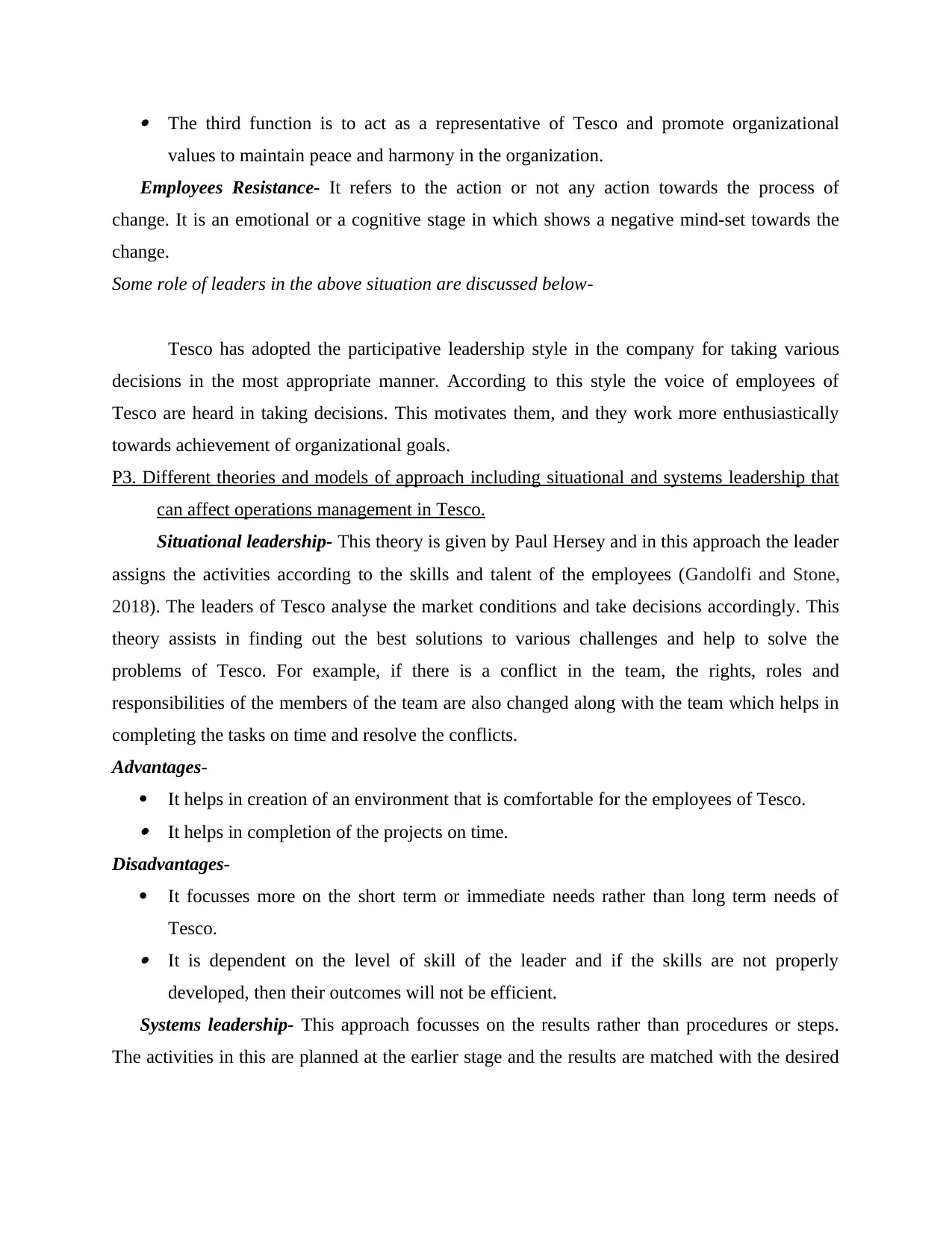
The third function is to act as a representative of Tesco and promote organizational
values to maintain peace and harmony in the organization.
Employees Resistance- It refers to the action or not any action towards the process of
change. It is an emotional or a cognitive stage in which shows a negative mind-set towards the
change.
Some role of leaders in the above situation are discussed below-
Tesco has adopted the participative leadership style in the company for taking various
decisions in the most appropriate manner. According to this style the voice of employees of
Tesco are heard in taking decisions. This motivates them, and they work more enthusiastically
towards achievement of organizational goals.
P3. Different theories and models of approach including situational and systems leadership that
can affect operations management in Tesco.
Situational leadership- This theory is given by Paul Hersey and in this approach the leader
assigns the activities according to the skills and talent of the employees (Gandolfi and Stone,
2018). The leaders of Tesco analyse the market conditions and take decisions accordingly. This
theory assists in finding out the best solutions to various challenges and help to solve the
problems of Tesco. For example, if there is a conflict in the team, the rights, roles and
responsibilities of the members of the team are also changed along with the team which helps in
completing the tasks on time and resolve the conflicts.
Advantages-
It helps in creation of an environment that is comfortable for the employees of Tesco. It helps in completion of the projects on time.
Disadvantages-
It focusses more on the short term or immediate needs rather than long term needs of
Tesco. It is dependent on the level of skill of the leader and if the skills are not properly
developed, then their outcomes will not be efficient.
Systems leadership- This approach focusses on the results rather than procedures or steps.
The activities in this are planned at the earlier stage and the results are matched with the desired
values to maintain peace and harmony in the organization.
Employees Resistance- It refers to the action or not any action towards the process of
change. It is an emotional or a cognitive stage in which shows a negative mind-set towards the
change.
Some role of leaders in the above situation are discussed below-
Tesco has adopted the participative leadership style in the company for taking various
decisions in the most appropriate manner. According to this style the voice of employees of
Tesco are heard in taking decisions. This motivates them, and they work more enthusiastically
towards achievement of organizational goals.
P3. Different theories and models of approach including situational and systems leadership that
can affect operations management in Tesco.
Situational leadership- This theory is given by Paul Hersey and in this approach the leader
assigns the activities according to the skills and talent of the employees (Gandolfi and Stone,
2018). The leaders of Tesco analyse the market conditions and take decisions accordingly. This
theory assists in finding out the best solutions to various challenges and help to solve the
problems of Tesco. For example, if there is a conflict in the team, the rights, roles and
responsibilities of the members of the team are also changed along with the team which helps in
completing the tasks on time and resolve the conflicts.
Advantages-
It helps in creation of an environment that is comfortable for the employees of Tesco. It helps in completion of the projects on time.
Disadvantages-
It focusses more on the short term or immediate needs rather than long term needs of
Tesco. It is dependent on the level of skill of the leader and if the skills are not properly
developed, then their outcomes will not be efficient.
Systems leadership- This approach focusses on the results rather than procedures or steps.
The activities in this are planned at the earlier stage and the results are matched with the desired
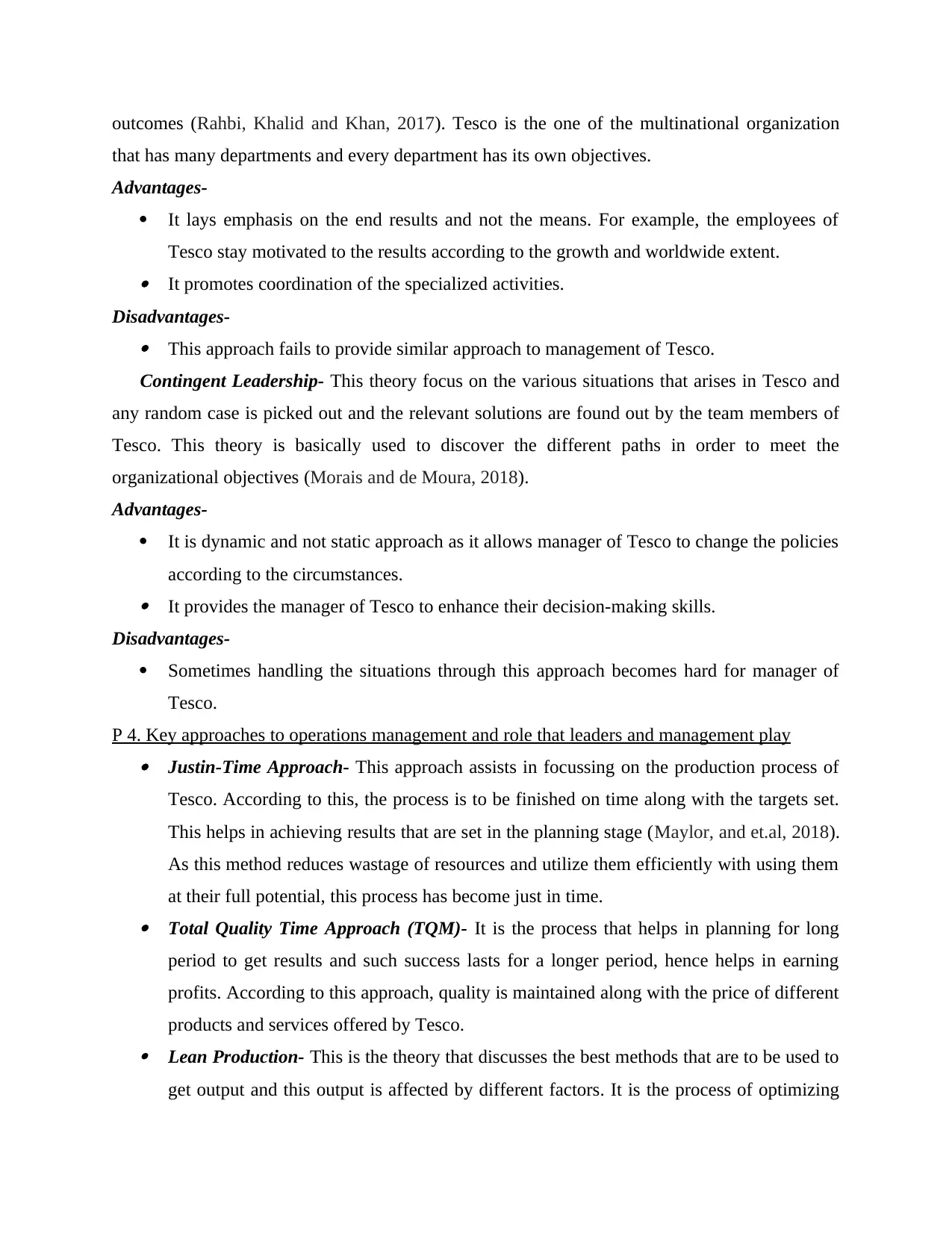
outcomes (Rahbi, Khalid and Khan, 2017). Tesco is the one of the multinational organization
that has many departments and every department has its own objectives.
Advantages-
It lays emphasis on the end results and not the means. For example, the employees of
Tesco stay motivated to the results according to the growth and worldwide extent. It promotes coordination of the specialized activities.
Disadvantages- This approach fails to provide similar approach to management of Tesco.
Contingent Leadership- This theory focus on the various situations that arises in Tesco and
any random case is picked out and the relevant solutions are found out by the team members of
Tesco. This theory is basically used to discover the different paths in order to meet the
organizational objectives (Morais and de Moura, 2018).
Advantages-
It is dynamic and not static approach as it allows manager of Tesco to change the policies
according to the circumstances. It provides the manager of Tesco to enhance their decision-making skills.
Disadvantages-
Sometimes handling the situations through this approach becomes hard for manager of
Tesco.
P 4. Key approaches to operations management and role that leaders and management play Justin-Time Approach- This approach assists in focussing on the production process of
Tesco. According to this, the process is to be finished on time along with the targets set.
This helps in achieving results that are set in the planning stage (Maylor, and et.al, 2018).
As this method reduces wastage of resources and utilize them efficiently with using them
at their full potential, this process has become just in time. Total Quality Time Approach (TQM)- It is the process that helps in planning for long
period to get results and such success lasts for a longer period, hence helps in earning
profits. According to this approach, quality is maintained along with the price of different
products and services offered by Tesco. Lean Production- This is the theory that discusses the best methods that are to be used to
get output and this output is affected by different factors. It is the process of optimizing
that has many departments and every department has its own objectives.
Advantages-
It lays emphasis on the end results and not the means. For example, the employees of
Tesco stay motivated to the results according to the growth and worldwide extent. It promotes coordination of the specialized activities.
Disadvantages- This approach fails to provide similar approach to management of Tesco.
Contingent Leadership- This theory focus on the various situations that arises in Tesco and
any random case is picked out and the relevant solutions are found out by the team members of
Tesco. This theory is basically used to discover the different paths in order to meet the
organizational objectives (Morais and de Moura, 2018).
Advantages-
It is dynamic and not static approach as it allows manager of Tesco to change the policies
according to the circumstances. It provides the manager of Tesco to enhance their decision-making skills.
Disadvantages-
Sometimes handling the situations through this approach becomes hard for manager of
Tesco.
P 4. Key approaches to operations management and role that leaders and management play Justin-Time Approach- This approach assists in focussing on the production process of
Tesco. According to this, the process is to be finished on time along with the targets set.
This helps in achieving results that are set in the planning stage (Maylor, and et.al, 2018).
As this method reduces wastage of resources and utilize them efficiently with using them
at their full potential, this process has become just in time. Total Quality Time Approach (TQM)- It is the process that helps in planning for long
period to get results and such success lasts for a longer period, hence helps in earning
profits. According to this approach, quality is maintained along with the price of different
products and services offered by Tesco. Lean Production- This is the theory that discusses the best methods that are to be used to
get output and this output is affected by different factors. It is the process of optimizing
⊘ This is a preview!⊘
Do you want full access?
Subscribe today to unlock all pages.

Trusted by 1+ million students worldwide
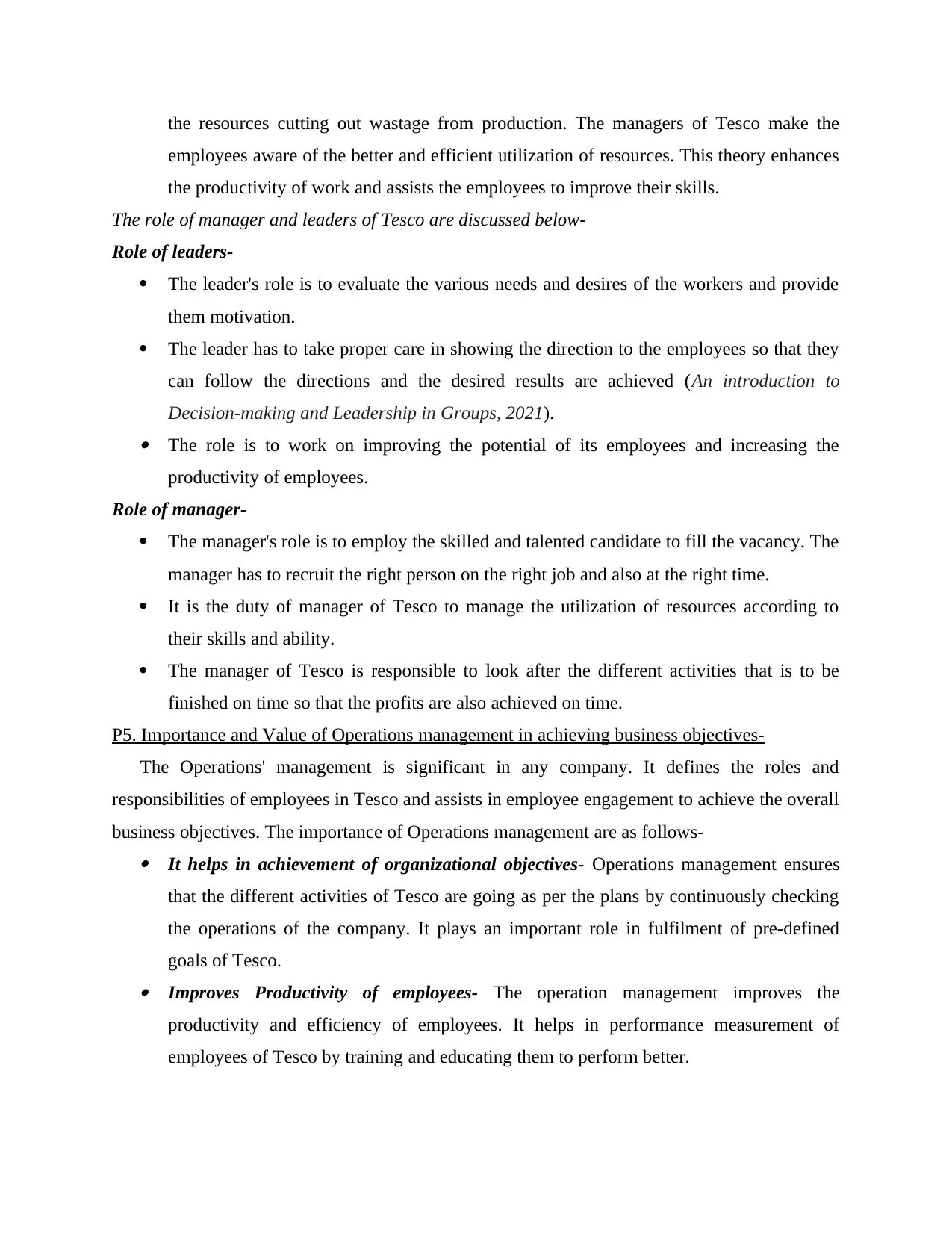
the resources cutting out wastage from production. The managers of Tesco make the
employees aware of the better and efficient utilization of resources. This theory enhances
the productivity of work and assists the employees to improve their skills.
The role of manager and leaders of Tesco are discussed below-
Role of leaders-
The leader's role is to evaluate the various needs and desires of the workers and provide
them motivation.
The leader has to take proper care in showing the direction to the employees so that they
can follow the directions and the desired results are achieved (An introduction to
Decision-making and Leadership in Groups, 2021). The role is to work on improving the potential of its employees and increasing the
productivity of employees.
Role of manager-
The manager's role is to employ the skilled and talented candidate to fill the vacancy. The
manager has to recruit the right person on the right job and also at the right time.
It is the duty of manager of Tesco to manage the utilization of resources according to
their skills and ability.
The manager of Tesco is responsible to look after the different activities that is to be
finished on time so that the profits are also achieved on time.
P5. Importance and Value of Operations management in achieving business objectives-
The Operations' management is significant in any company. It defines the roles and
responsibilities of employees in Tesco and assists in employee engagement to achieve the overall
business objectives. The importance of Operations management are as follows- It helps in achievement of organizational objectives- Operations management ensures
that the different activities of Tesco are going as per the plans by continuously checking
the operations of the company. It plays an important role in fulfilment of pre-defined
goals of Tesco. Improves Productivity of employees- The operation management improves the
productivity and efficiency of employees. It helps in performance measurement of
employees of Tesco by training and educating them to perform better.
employees aware of the better and efficient utilization of resources. This theory enhances
the productivity of work and assists the employees to improve their skills.
The role of manager and leaders of Tesco are discussed below-
Role of leaders-
The leader's role is to evaluate the various needs and desires of the workers and provide
them motivation.
The leader has to take proper care in showing the direction to the employees so that they
can follow the directions and the desired results are achieved (An introduction to
Decision-making and Leadership in Groups, 2021). The role is to work on improving the potential of its employees and increasing the
productivity of employees.
Role of manager-
The manager's role is to employ the skilled and talented candidate to fill the vacancy. The
manager has to recruit the right person on the right job and also at the right time.
It is the duty of manager of Tesco to manage the utilization of resources according to
their skills and ability.
The manager of Tesco is responsible to look after the different activities that is to be
finished on time so that the profits are also achieved on time.
P5. Importance and Value of Operations management in achieving business objectives-
The Operations' management is significant in any company. It defines the roles and
responsibilities of employees in Tesco and assists in employee engagement to achieve the overall
business objectives. The importance of Operations management are as follows- It helps in achievement of organizational objectives- Operations management ensures
that the different activities of Tesco are going as per the plans by continuously checking
the operations of the company. It plays an important role in fulfilment of pre-defined
goals of Tesco. Improves Productivity of employees- The operation management improves the
productivity and efficiency of employees. It helps in performance measurement of
employees of Tesco by training and educating them to perform better.
Paraphrase This Document
Need a fresh take? Get an instant paraphrase of this document with our AI Paraphraser
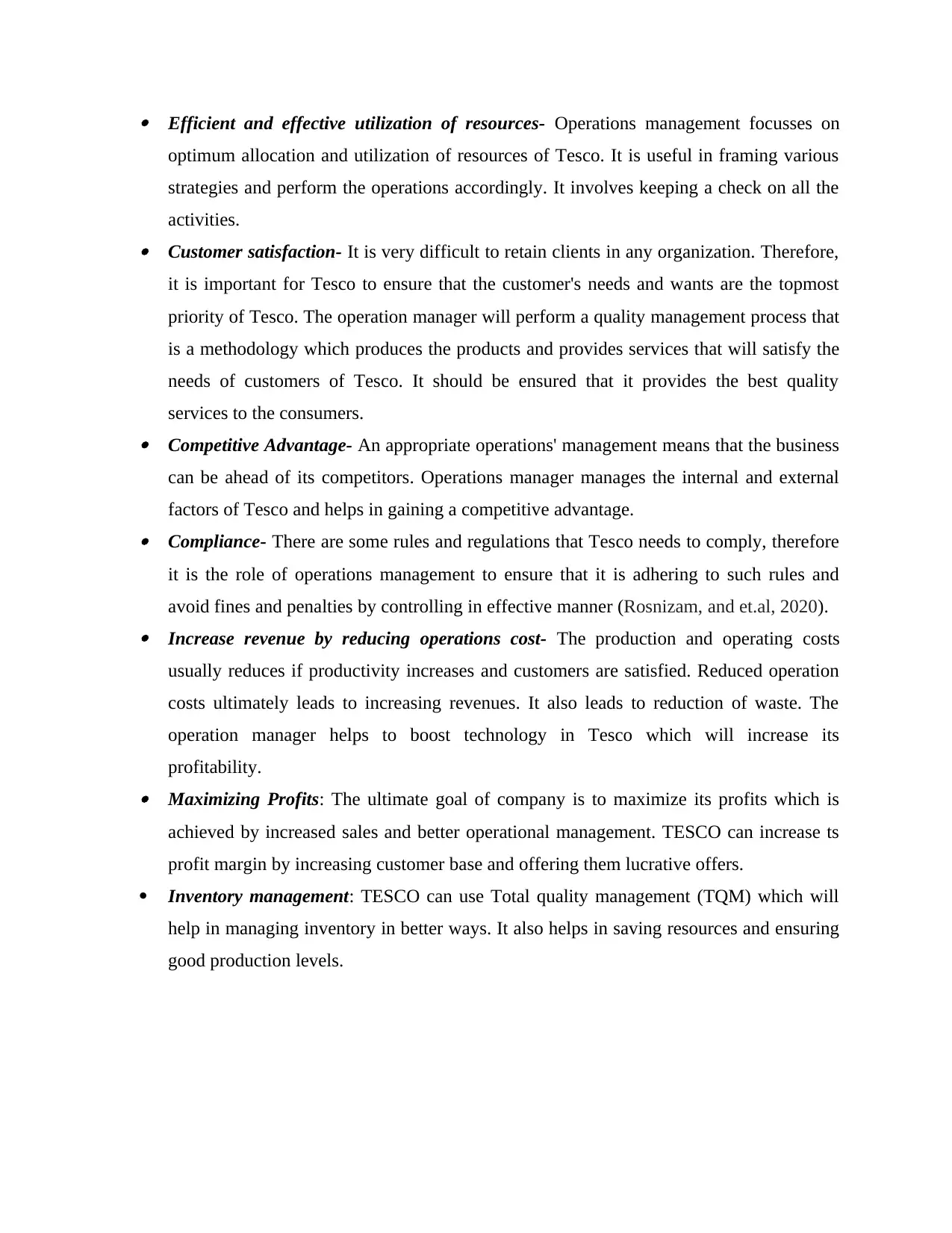
Efficient and effective utilization of resources- Operations management focusses on
optimum allocation and utilization of resources of Tesco. It is useful in framing various
strategies and perform the operations accordingly. It involves keeping a check on all the
activities. Customer satisfaction- It is very difficult to retain clients in any organization. Therefore,
it is important for Tesco to ensure that the customer's needs and wants are the topmost
priority of Tesco. The operation manager will perform a quality management process that
is a methodology which produces the products and provides services that will satisfy the
needs of customers of Tesco. It should be ensured that it provides the best quality
services to the consumers. Competitive Advantage- An appropriate operations' management means that the business
can be ahead of its competitors. Operations manager manages the internal and external
factors of Tesco and helps in gaining a competitive advantage. Compliance- There are some rules and regulations that Tesco needs to comply, therefore
it is the role of operations management to ensure that it is adhering to such rules and
avoid fines and penalties by controlling in effective manner (Rosnizam, and et.al, 2020). Increase revenue by reducing operations cost- The production and operating costs
usually reduces if productivity increases and customers are satisfied. Reduced operation
costs ultimately leads to increasing revenues. It also leads to reduction of waste. The
operation manager helps to boost technology in Tesco which will increase its
profitability. Maximizing Profits: The ultimate goal of company is to maximize its profits which is
achieved by increased sales and better operational management. TESCO can increase ts
profit margin by increasing customer base and offering them lucrative offers.
Inventory management: TESCO can use Total quality management (TQM) which will
help in managing inventory in better ways. It also helps in saving resources and ensuring
good production levels.
optimum allocation and utilization of resources of Tesco. It is useful in framing various
strategies and perform the operations accordingly. It involves keeping a check on all the
activities. Customer satisfaction- It is very difficult to retain clients in any organization. Therefore,
it is important for Tesco to ensure that the customer's needs and wants are the topmost
priority of Tesco. The operation manager will perform a quality management process that
is a methodology which produces the products and provides services that will satisfy the
needs of customers of Tesco. It should be ensured that it provides the best quality
services to the consumers. Competitive Advantage- An appropriate operations' management means that the business
can be ahead of its competitors. Operations manager manages the internal and external
factors of Tesco and helps in gaining a competitive advantage. Compliance- There are some rules and regulations that Tesco needs to comply, therefore
it is the role of operations management to ensure that it is adhering to such rules and
avoid fines and penalties by controlling in effective manner (Rosnizam, and et.al, 2020). Increase revenue by reducing operations cost- The production and operating costs
usually reduces if productivity increases and customers are satisfied. Reduced operation
costs ultimately leads to increasing revenues. It also leads to reduction of waste. The
operation manager helps to boost technology in Tesco which will increase its
profitability. Maximizing Profits: The ultimate goal of company is to maximize its profits which is
achieved by increased sales and better operational management. TESCO can increase ts
profit margin by increasing customer base and offering them lucrative offers.
Inventory management: TESCO can use Total quality management (TQM) which will
help in managing inventory in better ways. It also helps in saving resources and ensuring
good production levels.
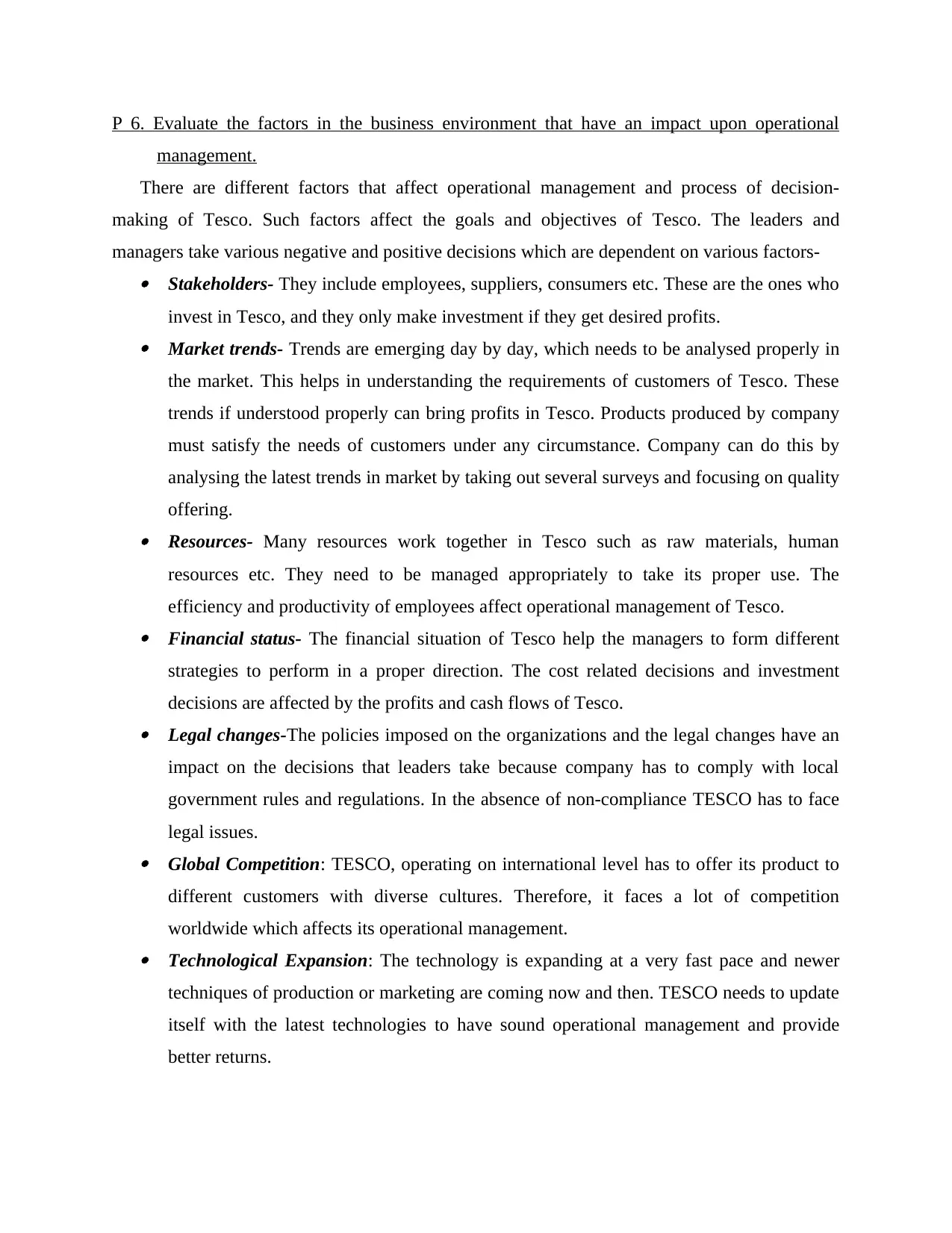
P 6. Evaluate the factors in the business environment that have an impact upon operational
management.
There are different factors that affect operational management and process of decision-
making of Tesco. Such factors affect the goals and objectives of Tesco. The leaders and
managers take various negative and positive decisions which are dependent on various factors- Stakeholders- They include employees, suppliers, consumers etc. These are the ones who
invest in Tesco, and they only make investment if they get desired profits. Market trends- Trends are emerging day by day, which needs to be analysed properly in
the market. This helps in understanding the requirements of customers of Tesco. These
trends if understood properly can bring profits in Tesco. Products produced by company
must satisfy the needs of customers under any circumstance. Company can do this by
analysing the latest trends in market by taking out several surveys and focusing on quality
offering. Resources- Many resources work together in Tesco such as raw materials, human
resources etc. They need to be managed appropriately to take its proper use. The
efficiency and productivity of employees affect operational management of Tesco. Financial status- The financial situation of Tesco help the managers to form different
strategies to perform in a proper direction. The cost related decisions and investment
decisions are affected by the profits and cash flows of Tesco. Legal changes-The policies imposed on the organizations and the legal changes have an
impact on the decisions that leaders take because company has to comply with local
government rules and regulations. In the absence of non-compliance TESCO has to face
legal issues. Global Competition: TESCO, operating on international level has to offer its product to
different customers with diverse cultures. Therefore, it faces a lot of competition
worldwide which affects its operational management. Technological Expansion: The technology is expanding at a very fast pace and newer
techniques of production or marketing are coming now and then. TESCO needs to update
itself with the latest technologies to have sound operational management and provide
better returns.
management.
There are different factors that affect operational management and process of decision-
making of Tesco. Such factors affect the goals and objectives of Tesco. The leaders and
managers take various negative and positive decisions which are dependent on various factors- Stakeholders- They include employees, suppliers, consumers etc. These are the ones who
invest in Tesco, and they only make investment if they get desired profits. Market trends- Trends are emerging day by day, which needs to be analysed properly in
the market. This helps in understanding the requirements of customers of Tesco. These
trends if understood properly can bring profits in Tesco. Products produced by company
must satisfy the needs of customers under any circumstance. Company can do this by
analysing the latest trends in market by taking out several surveys and focusing on quality
offering. Resources- Many resources work together in Tesco such as raw materials, human
resources etc. They need to be managed appropriately to take its proper use. The
efficiency and productivity of employees affect operational management of Tesco. Financial status- The financial situation of Tesco help the managers to form different
strategies to perform in a proper direction. The cost related decisions and investment
decisions are affected by the profits and cash flows of Tesco. Legal changes-The policies imposed on the organizations and the legal changes have an
impact on the decisions that leaders take because company has to comply with local
government rules and regulations. In the absence of non-compliance TESCO has to face
legal issues. Global Competition: TESCO, operating on international level has to offer its product to
different customers with diverse cultures. Therefore, it faces a lot of competition
worldwide which affects its operational management. Technological Expansion: The technology is expanding at a very fast pace and newer
techniques of production or marketing are coming now and then. TESCO needs to update
itself with the latest technologies to have sound operational management and provide
better returns.
⊘ This is a preview!⊘
Do you want full access?
Subscribe today to unlock all pages.

Trusted by 1+ million students worldwide
1 out of 15
Related Documents
Your All-in-One AI-Powered Toolkit for Academic Success.
+13062052269
info@desklib.com
Available 24*7 on WhatsApp / Email
![[object Object]](/_next/static/media/star-bottom.7253800d.svg)
Unlock your academic potential
Copyright © 2020–2026 A2Z Services. All Rights Reserved. Developed and managed by ZUCOL.





